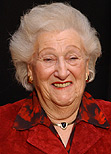June 23, 2009
Helen Luksenburg discusses forming a close friendship with Welek, now William Luksenburg, a fellow prisoner in Gleiwitz, a subcamp of the Auschwitz concentration camp.
LISTEN
Esta página también está disponible en español.
Related Content
TRANSCRIPT
HELEN LUKSENBURG:
He comes over to me and talks to me and after he says to me, "You see we will survive and I will marry you."
NARRATOR:
Over 60 years after the Holocaust, hatred, antisemitism, and genocide still threaten our world. The life stories of Holocaust survivors transcend the decades and remind us of the constant need to be vigilant citizens and to stop injustice, prejudice, and hatred wherever and whenever they occur.
This podcast series presents excerpts of interviews with Holocaust survivors from the United States Holocaust Memorial Museum’s public program First Person; Conversations with Holocaust Survivors.
In today’s episode Helen Luksenburg talks with host Bill Benson about forming a close friendship with William Luksenburg in Gleiwitz, a subcamp of Auschwitz. When they were evacuated from Gleiwitz in January 1945, William and Helen were separated. They were eventually reunited after the war and were married in March of 1947.
BILL BENSON:
Helen, the one thing if there is anything that you could say that was positive throughout all of that was that you met William.
HELEN LUKSENBURG:
Yes, but I didn’t know that ahead of time.
BILL BENSON:
Would you tell us about meeting him? How that was even possible?
HELEN LUKSENBURG:
His cousin was my friend. He worked in my hometown. She pointed him out to me once and I liked his looks. I was a teenager. So I ask her to introduce me to him, she never did. So can you imagine I come to the camp.
BILL BENSON:
This is Gleiwitz, right?
HELEN LUKSENBURG:
This is Gleiwitz. And I was, my barrack was the first one by the fence and I see on the other side of the fence was the men’s camp. Who is there? It’s like God was the matchmaker. So, I still didn’t know him. How did I meet him? At one time we couldn’t, we didn’t have water in our wash barracks and it was a back door from the men’s wash barrack. A door you could go and fetch some water. So I went to get some water and who is there washing his clothes? A friend of his was there, he introduced us. The next day I am in my barrack and somebody comes in and said, “Somebody wants to talk to you by the fence.” I go out, it’s him. That’s how it started.
BILL BENSON:
And you got to know each other by talking over this fence?
HELEN LUKSENBURG:
Over the fence, yes. He comes over to me and talks to me and after he says to me, “You see we will survive and I will marry you.” You know what my reaction was? I didn’t have any hope that I will survive. I touch his forehead--I thought that he has a high temperature. He is not conscious, what he is saying. That’s how I felt about it. Eventually, we walked together when they evacuated. I took with a needle and thing I made a little bag for him from his towel, the small towels he had that he put the piece of bread, what they gave him.
BILL BENSON:
You made this pouch for him to put his bread in.
HELEN LUKSENBURG:
That’s right, his piece of bread. After we were separated and I didn’t know if he survived and he didn’t know if I survived.
NARRATOR:
You have been listening to First Person: Conversations with Holocaust Survivors, a podcast series of the United States Holocaust Memorial Museum. Every Wednesday at 1 p.m. from March through August, Holocaust survivors share their stories during First Person programs held at the Museum in Washington, DC. We would appreciate your feedback on this series. [Please take our First Person podcast survey (external link) and let us know what you think.]
[On] our website you can also learn more about the Museum’s survivors, listen to the complete recordings of their conversations, and listen to the Museum podcasts Voices on Antisemitism and Voices on Genocide Prevention.


